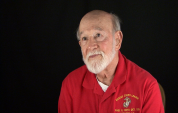7:37 | It was quiet at Koto-ri when Charles Vicari got there, but then the Chinese struck. The Marines got on trucks to head up to Hagaru-ri, but they were soon cut off. They repelled all attacks, but they had to withdraw down that same little mountain road they had ascended. The retreat from Chosin had begun.
Keywords : Charles Vicari Korea Koto-ri Chosin Reservoir Chinese Udamnee Hagaru-ri cold

While walking past a recruiting office, Charles Vicari made a spur of the moment decision to join the Marine Corps. When the Korean War broke out, he volunteered for duty on the west coast to replace Marines that had been sent there. He was told the duty may be a little further than the west coast.
The Marines leaving Japan finally found out on the ship where they were headed, the port of Inchon. The air was full of gunsmoke when Charles Vicari boarded the landing craft. Once ashore, he moved inland and on the fourth day, faced his first enemy attack.
There was stiff resistance at Yeongdeungpo as the Marines pushed toward Seoul. While crossing a large plaza at a crossroads, Charles Vicari was sure he was going to get it right there. When it was his turn to move out, he froze. After a not so gentle nudge, he ran across. After surviving that, he survived a North Korean counter attack.
After Seoul was liberated, Charles Vicari was sent back to Inchon. The Marines in his unit thought it was over and they were going home. Instead they were shipped around to the east coast to land at Wonsan. Pushing further and further north, they started up a long winding mountain road toward the Chosin Reservoir.
It was a fighting withdrawal, all the way down from the Chosin Reservoir. The Marines went to Pusan to lick their wounds and refit. Once ready, they moved out to Andong, where they patrolled and cleared the area. It was on one of these patrols to clear a ridge line that Charles Vicari shot a man at point blank range for the first time. What he saw had a profound effect on him.
The Marines had to take a large ridge line and it was a tough one. They started taking rifle fire and then mortar fire. Charles Vicari heard a loud crack and then felt like someone hit him in the back with a hot poker.
In 1951, Charles Vicari returned to duty after recovering from the wound he received in Korea. His enlistment was up in a matter of months, but he didn't find civilian life to his liking so he re-enlisted. When 1965 rolled around, he had a plum post, but President Johnson decided he was needed in Vietnam.
As he waited to step foot in Vietnam for the first time, Charles Vicari was obsessed with the thought of stepping in a punji pit. Then he jumped off the helicopter and...no punji pit. Once he was over that, he settled into his role as mortar platoon sergeant.
It was different from any other war in Vietnam. There were no front lines and the enemy could be anywhere. That's what Charles Vicari had to deal with as a Marine gunnery sergeant. He was also perplexed by the people he was there to help, like the Vietnamese militia member who wanted compensation for something that the Viet Cong did.
Charles Vicari already had experience in a Headquarters and Service company, so when he was offered the job as H&S gunnery sergeant while he was in Vietnam, he jumped at the chance. If they wanted him to not get shot at, it was fine with him.
When he got near the end of his Vietnam tour, Charles Vicari could not sleep, so the medical officer gave him some medication. This became a problem one night, when a mortar barrage came in. When his time was up, he finished up a career in the Marines in a much less dangerous North Carolina.